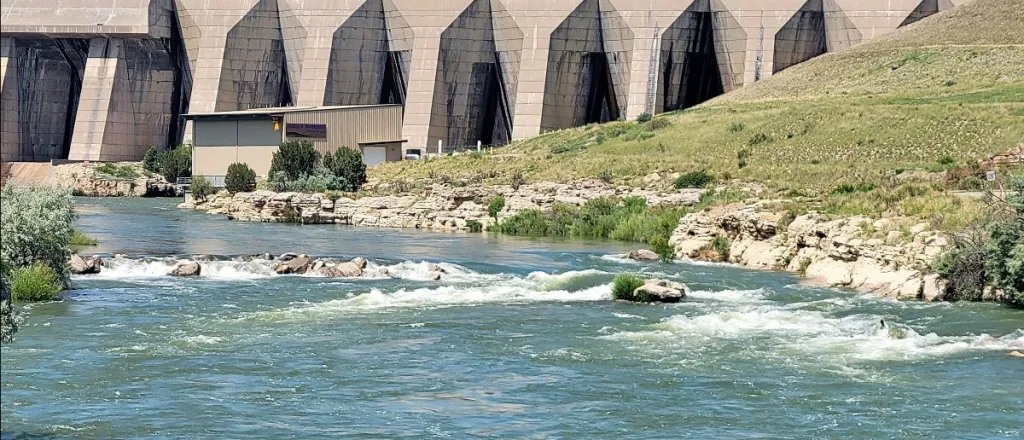
Updated Arkansas Valley Conduit cost estimates shared with stakeholders
Lake Pueblo Reservoir Dam - Colorado Parks and Wildlife.
A meeting to explain updated cost estimates for the Arkansas Valley Conduit (AVC) Project was held at Rocky Ford on June 27 with nearly 60 participants including about 40 people attending in person, and 20 more online.
At the meeting, stakeholders were able to hear the same presentation given a week earlier to the Southeastern Colorado Water Activity Enterprise Board of Directors. The Enterprise is the business arm of the Southeastern Colorado Water Conservancy District, and board members for each are the same.
Southeastern President Bill Long, Executive Director Leann Noga and AVC Project Manager Kevin Meador, and Bureau of Reclamation Eastern Colorado Area Office Area Manager Jeff Rieker presented at the meeting.
Questions about the cost, repayment conditions and schedule of the AVC were addressed following the presentation.
“We’re all in this together,” Long said. “One single question is extremely important: How much is this going to cost? We intentionally have not asked you to sign any agreement and we won’t ask you to sign any agreements until we can answer that question to your satisfaction. It’s that simple.”
Long pointed out that federal legislation in 2009 allowed miscellaneous revenues of the Fryingpan-Arkansas Project to help repay the participants’ share of the AVC.
“Our goal is to pursue legislation that will allow us to use those miscellaneous revenues until our share of the trunk line is paid. We want a fix that will not make that part of your monthly bill.”
During the presentation, updated AVC cost estimates were shared. The estimates are subject to revision by future changes in the AVC Project or inflation, so could be more or less, Rieker explained.
“As we move forward, we will get additional construction contracts out. That will give us more information. As we get additional design work done, that either locks in or removes some of the contingency I talked about. As time goes on, we will continue to adjust,” Rieker said.
The Reclamation Sub-Project, which includes the trunk line from Pueblo to Lamar and associated features, cost estimate is $1.3 billion. The Reclamation estimate includes about 35 percent contingencies for unknown costs. The Enterprise Sub-Project, which includes spurs and delivery lines, is $75 million. Estimates were made using data available in October 2023.
Participants are responsible for 100 percent of the Enterprise Sub-Project, and the Enterprise has worked to reduce that cost through obtaining grants. So far, the Enterprise has obtained a $30 million grant from the Colorado Water Conservation Board (CWCB) and is working with other state agencies to reduce the amount of debt that will ultimately be paid by participants.
There were concerns expressed by several people at the meeting that the participants will also accrue their own debt for improvements within their system.
Noga responded that the Enterprise is developing a “toolbox” to help participants navigate state and federal funding options.
“This is something we’ve had thoughts on in the past, but we are going to take that leap,” Noga said.
Participants also wanted to know when they would be asked to sign a contract for repayment. All 39 participants in the AVC have signed a Memorandum of Agreement to pay for development costs of AVC. The repayment agreement will include costs associated with construction, operation and maintenance of the AVC.
As Long indicated, participants won’t be asked to sign an agreement until costs are better understood.
Noga further explained that the Enterprise first must sign a repayment contract with Reclamation. Negotiations began in February 2024 but were put on hold until the updated cost estimates were available. The goal is to have miscellaneous revenues pay off the total cost of the trunk line, leaving only the cost of the spurs and delivery lines for participants to repay. One strategy for doing that is to extend the repayment period from 50 years (in the current draft contract) to in perpetuity.
“The contract that we started to negotiate is on hold at the moment,” Noga said. “There’s a number of elements that we want to make sure are in place before we go out to a final contract.”
Several questions focused on the schedule of AVC, which in 2020 was estimated to be completed to Lamar by 2035. That schedule has always depended on the availability of federal funds.
Rieker said the AVC has received priority attention among many Reclamation projects. “We’re encouraged by the funding we have received for the AVC Project.”
Participants also asked about the advantages and disadvantages of private water companies becoming authorities (a governmental entity), and whether their eligibility for increased funding opportunities would put them in competition with municipalities seeking the same sort of funding.
Meador explained that conversion of the private companies to authorities will also benefit all participants by reducing total costs of the spurs and delivery lines.
















